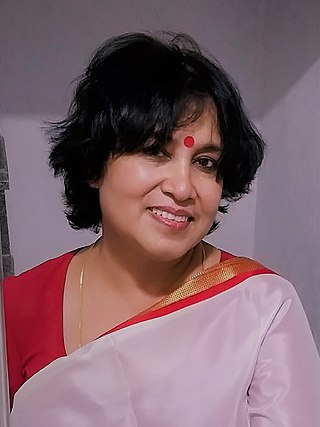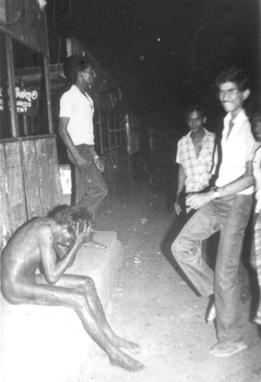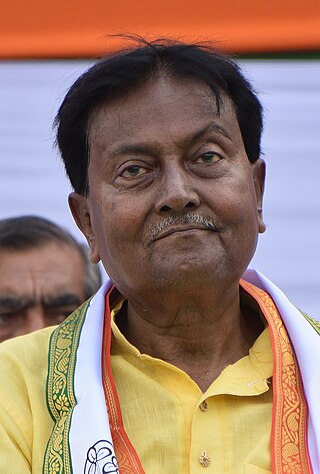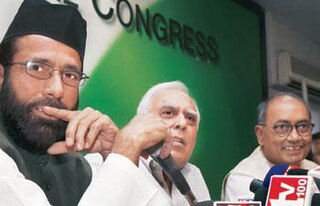
Taslima Nasrin is a Bangladeshi writer, physician, feminist, secular humanist, and activist. She is known for her writing on women's oppression and criticism of religion; some of her books are banned in Bangladesh. She has also been blacklisted and banished from the Bengal region, both from Bangladesh and the Indian state of West Bengal.

Godhra is a municipality in Panchmahal district in Indian state of Gujarat. It is the administrative headquarters of the Panchmahal district. Originally the name came from gou which means "cow" and dhara- which have two meanings depending on how you pronounce the word: 'dharaa' means a feminine thing or person that "holds" something and it usually means"land", and the other pronunciation is 'dhaaraa' in which means "flow". However, the second pronunciation is not popular nor is usually associated with this word. Hence, 'Godhra or Godharaa' means the Land of the Cow.

Direct Action Day was the day the All-India Muslim League decided to take a "direct action" using violence to intimidate non-muslims and their leadership for a separate Muslim homeland after the British exit from India. Also known as the 1946 Calcutta Killings, it was a day of nationwide communal riots. It led to large-scale violence between Muslims and Hindus in the city of Calcutta in the Bengal province of British India. The day also marked the start of what is known as The Week of the Long Knives. While there is a certain degree of consensus on the magnitude of the killings, including their short-term consequences, controversy remains regarding the exact sequence of events, the various actors' responsibility and the long-term political consequences.

Black July was an anti-Tamil pogrom that occurred in Sri Lanka during July 1983. The pogrom was premeditated, and was finally triggered by a deadly ambush on a Sri Lankan Army patrol by the Liberation Tigers of Tamil Eelam (LTTE) on 23 July 1983, which killed 13 soldiers. Although initially orchestrated by members of the ruling UNP, the pogrom soon escalated into mass violence with significant public participation.
Religious violence in India includes acts of violence by followers of one religious group against followers and institutions of another religious group, often in the form of rioting. Religious violence in India has generally involved Hindus and Muslims.

The Noakhali riots were a series of semi-organized massacres, rapes and abductions, combined with looting and arson of Hindu properties, perpetrated by the Muslim community in the districts of Noakhali in the Chittagong Division of Bengal in October–November 1946, a year before India's independence from British rule.
The 2010 Deganga riots occurred at Deganga, North 24 Parganas in West Bengal, India on 6 September 2010 by local Muslim against Hindu community over a disputed land. The violence began late in the evening of that Monday and continued throughout the night and for several subsequent days. The district police, Rapid Action Force, paramilitary were all unable to quell the problems and the Indian Army was eventually deployed. The army staged a series of flag marches on the Taki Road but the violence continued in the interior villages lying off that road until Thursday, despite the army presence and the promulgation of prohibitory orders under section 144 of the Criminal Procedure Code. Military Commanders on approval by the state Government imposed AFSPA.

The 1964 East Pakistan riots refer to the massacre and ethnic cleansing of Bengali Hindus from East Pakistan in the wake of an alleged theft of what was believed to be the Prophet's hair from the Hazratbal shrine in Jammu and Kashmir in India. The salient feature of the pogroms was its urban nature and selective targeting of Bengali Hindu owned industries and merchant establishments in the capital city of Dhaka. This resulted in unending waves of Bengali Hindu refugees in neighbouring West Bengal. The refugee rehabilitation became a national problem in India, and hundreds of refugees were resettled in Dandakaranya region of Odisha & Madhya Pradesh.

The 1950 East Pakistan riots took place between Hindus and Muslims in East Pakistan, which resulted in several thousands of Hindus being killed in pogroms.

The Bhagalpur violence of 1989 took place between Hindus and Muslims in the Bhagalpur district of Bihar, India. The violence started on 24 October 1989, and the violent incidents continued for 2 months, affecting the Bhagalpur city and 250 villages around it. Over 1,000 people were killed, and another 50,000 were displaced as a result of the violence. It was the worst instance of Hindu-Muslim violence in independent India at the time.
In 1990, a series of attacks against the Bengali Hindus in Bangladesh occurred in late October and early November, following a rumour that the Babri mosque in Ayodhya in India had been demolished. The attacks on the Hindus began on 30 October and continued till 2 November.
The Dhule riots were riots between the Hindu and Muslim community that took place in December 1992, October 2008 and January 2013 in Dhule in northern Maharashtra, India. These riots led to death of more than 18 people in the rioting as well as police firing. Hundreds of civilians and police were injured.
The 2013 Canning riots were anti Bengali Hindu riots in state of West Bengal on 21 February 2013. The riots occurred in the Canning subdivision, after a Muslim cleric was stopped and killed by half dozen unidentified assailants near Nalekhali. Following this incident, more than 200 homes were burned down in the villages of Naliakhali, Herobhanga, Gopalpur and Goladogra villages in the Canning police station area. Several shops were looted in Jaynagar Majilpur police station area under Baruipur subdivision. Incidents of violence were reported from Canning, Jaynagar, Kultali and Basanti police station areas.

The 1980 Moradabad riots, also known as the refers to violence that happened in the Indian city of Moradabad during August–November 1980. When a pig entered the local Idgah during the Eid festival prayer on 13 August, local Muslims asked the police to remove the pig, but the police refused to do so. This led to a confrontation between the police and the Muslims. The police responded with indiscriminate firing, which led to many deaths. This was followed by a series of violent incidents which became religious in nature, and led to arson, looting and murders.

The 1985 Gujarat riots began in February 1985 and lasted till August, in the Indian state of Gujarat. Most of the rioting occurred in the city of Ahmedabad; some other cities, including the state capital of Gandhinagar, were also affected. Between 220 and 275 people were killed in the violence, while several thousands of others were injured, and tens of thousands were displaced. The riots also caused widespread property damage.

Idris Ali was an Indian politician who was a Member of Parliament for the 16th Lok Sabha from Basirhat, West Bengal. He was elected in the 2014 Indian general election as an All India Trinamool Congress candidate.

Tauqeer Raza Khan is an Indian politician and Islamic cleric. He is a religious leader of the Bareilvi Sunni Muslims and founder of the Ittehad-e-Millat Council, a political party based in Uttar Pradesh. He is a great grandson of Ahmed Raza Khan Barelvi, who was the founder of the Barelvi movement of Sunni Islam. He also heads the All India Muslim Personal Law Board (Jadeed) after he cut ties with the All India Muslim Personal Law Board, claiming discrimination by the Deobandis.

Dwikhandito is an autobiographical book of Bengali novelist and poet Taslima Nasrin, published in 2003. This is the third volume of Amar Meyebela. The book was first published in Bangladesh under the title Ko ("Speak") and banned. It was also banned in the Indian state of West Bengal for two years alleging insult of religious beliefs and obscenity. In March 2018 the book was translated into English and published as Split: A Life by Penguin Random House.
The 1964 Calcutta riot was a religious riot that occurred in January 1964 and spread throughout the city of Calcutta. The violence was a reaction to Muslims attack on Hindu in neighboring Bangladesh by Muslim mobs. This event was the first intense religious violence in the city since the 1946 riots.












